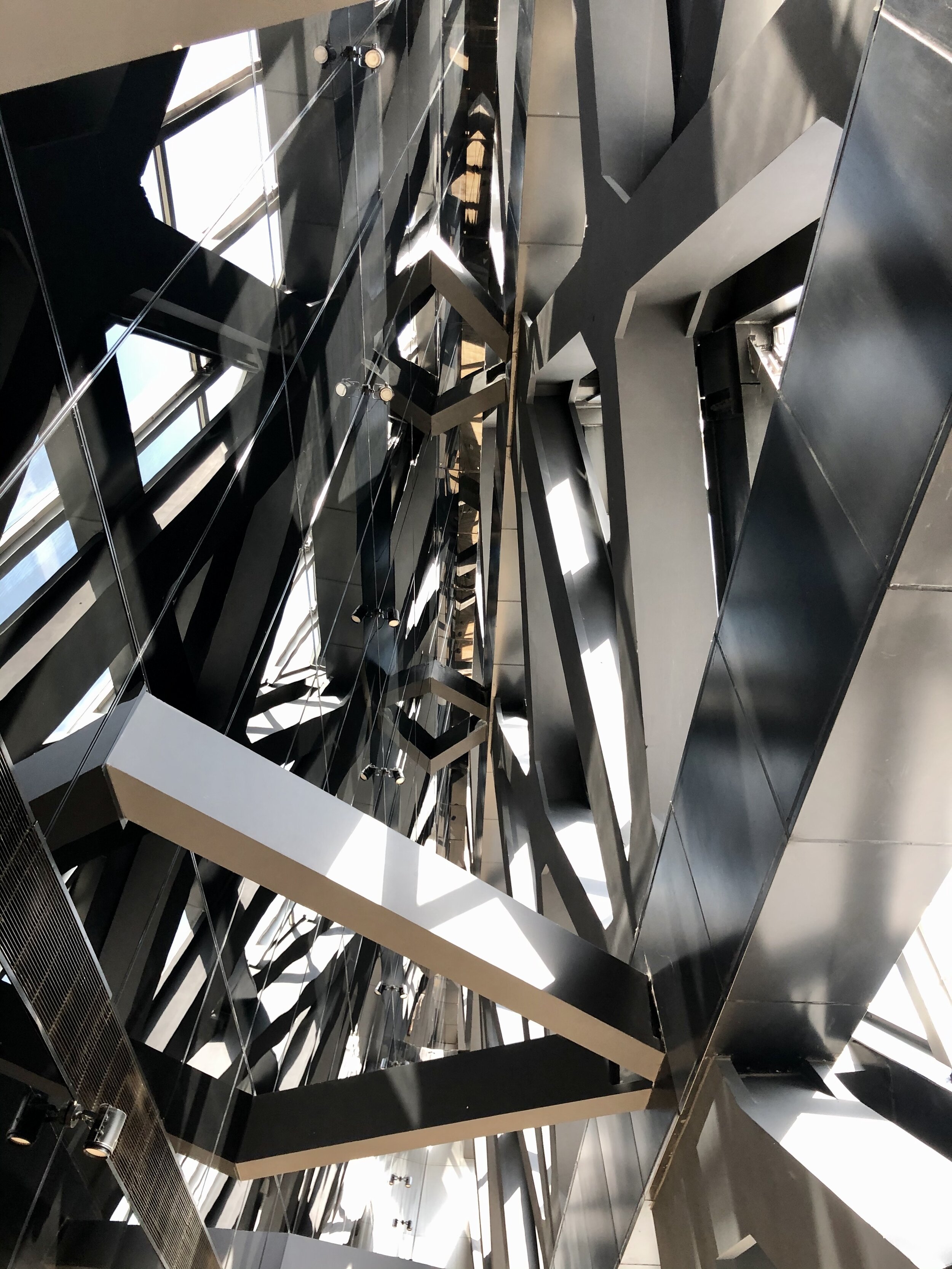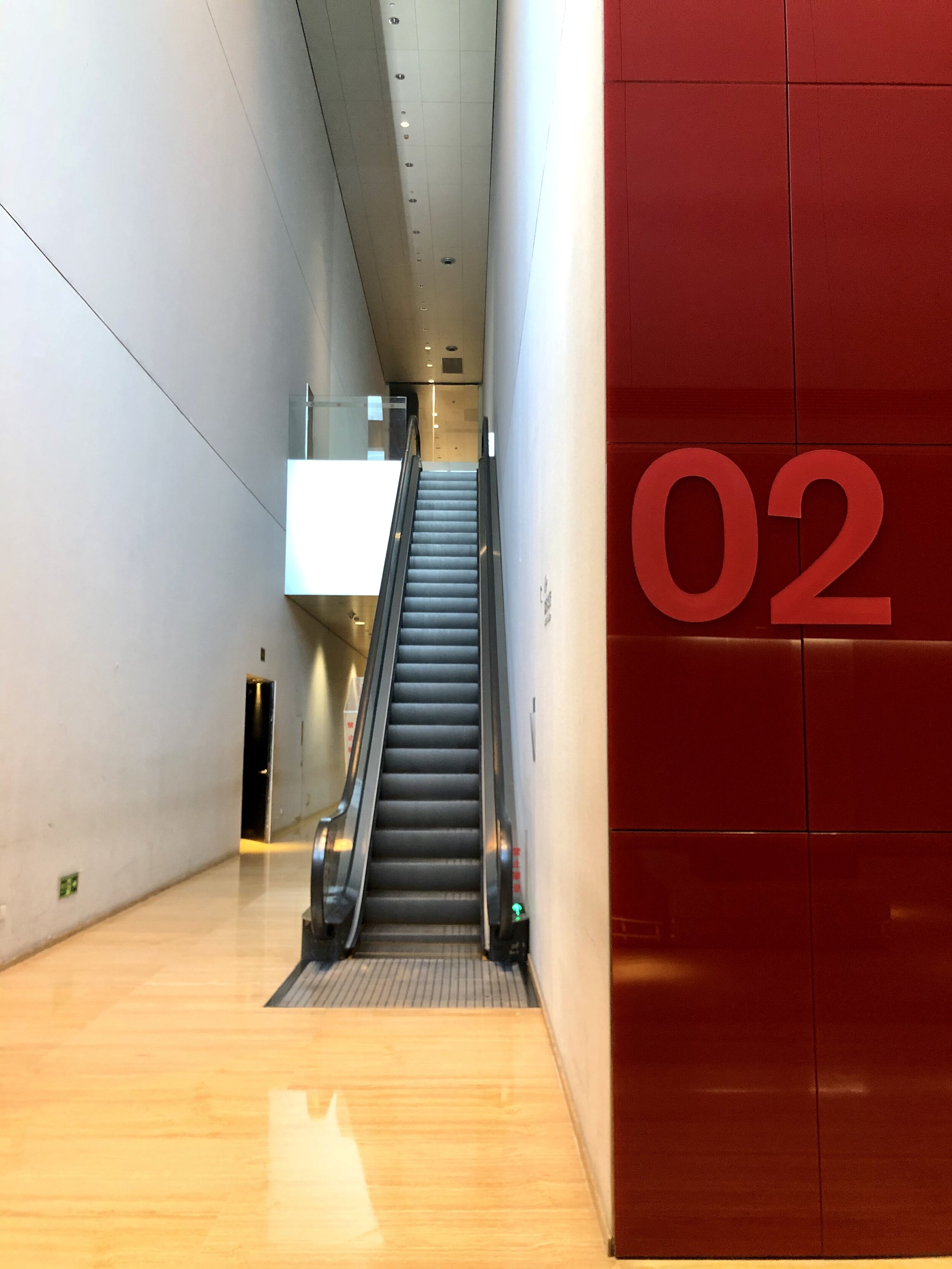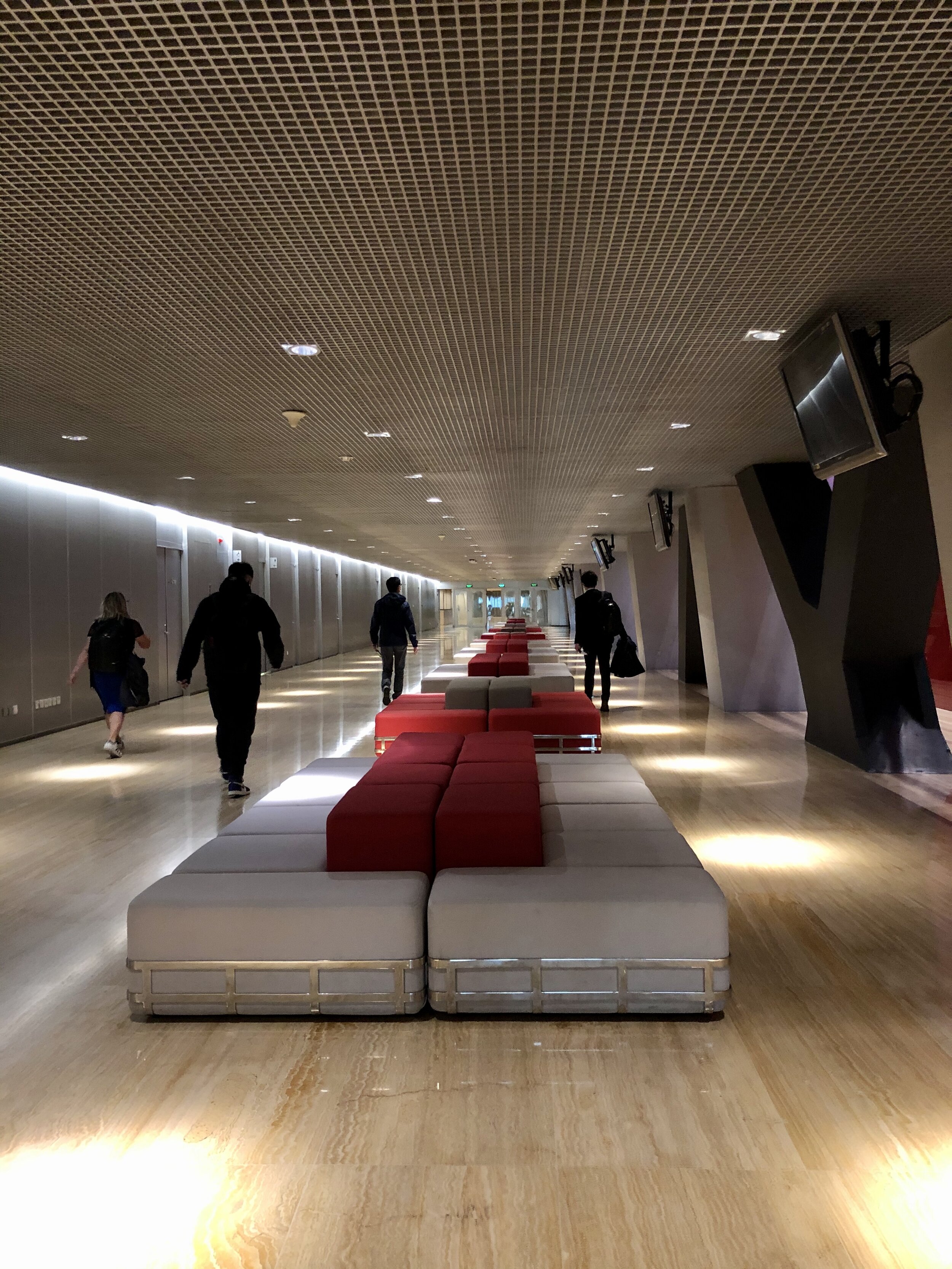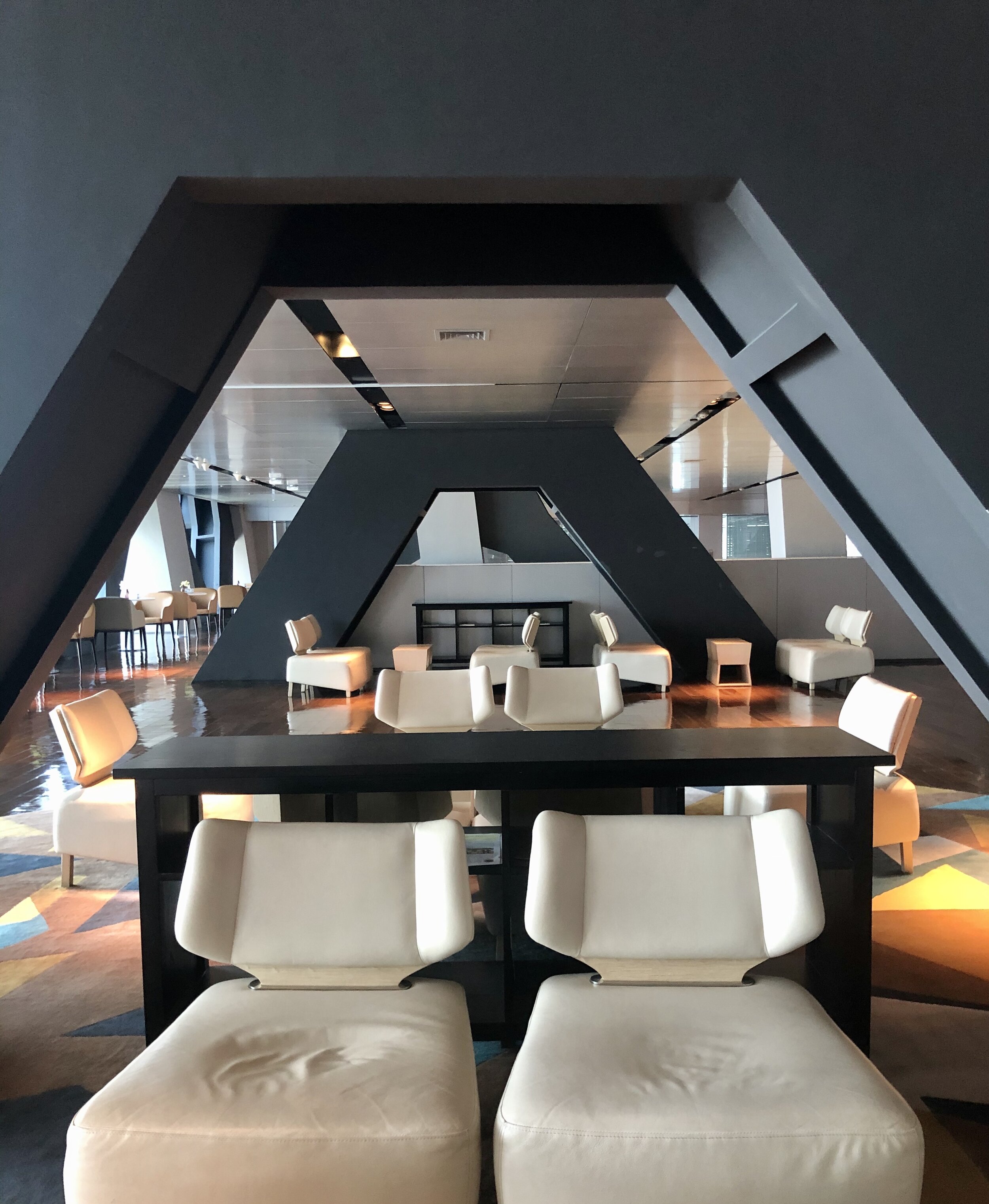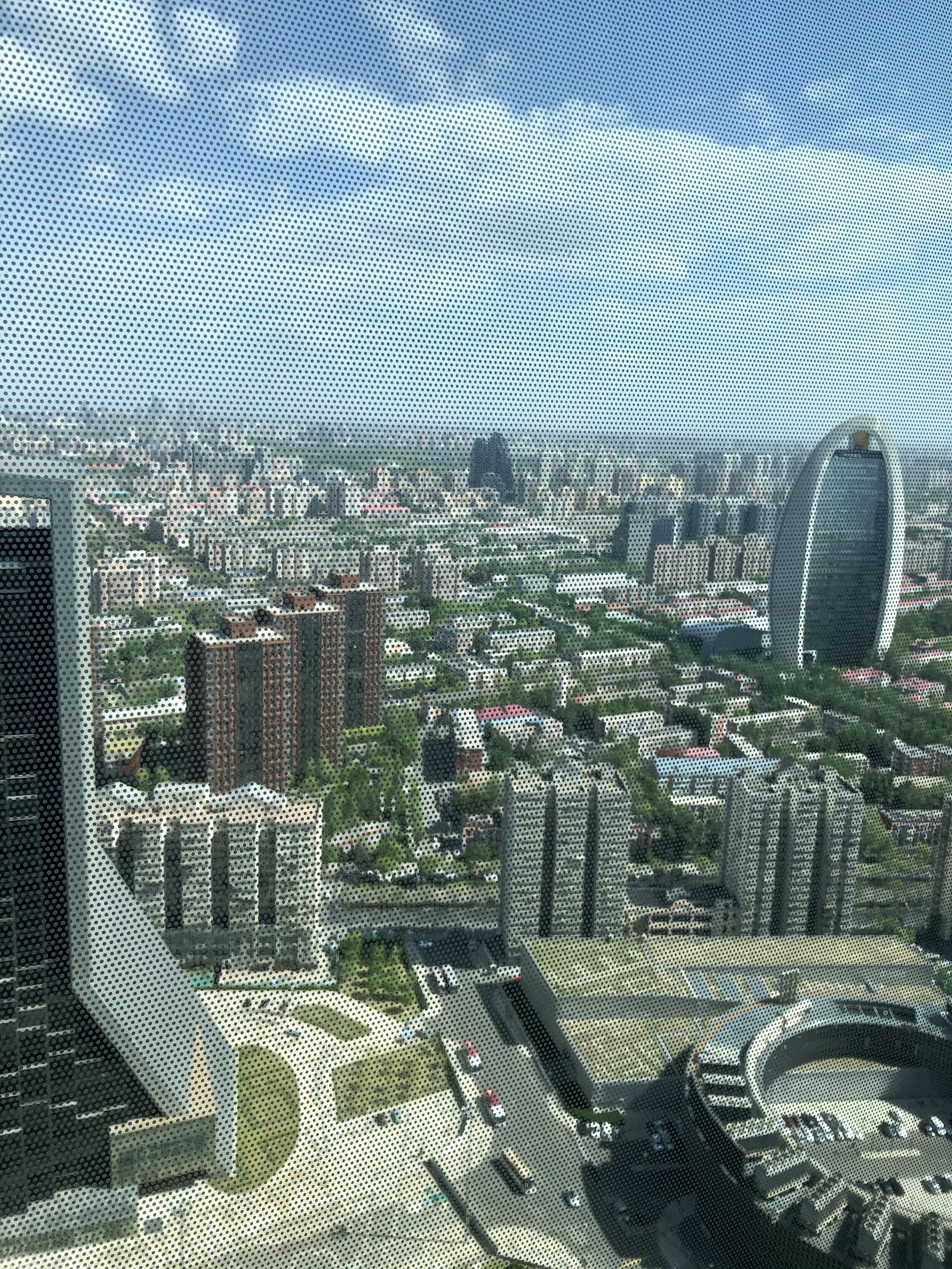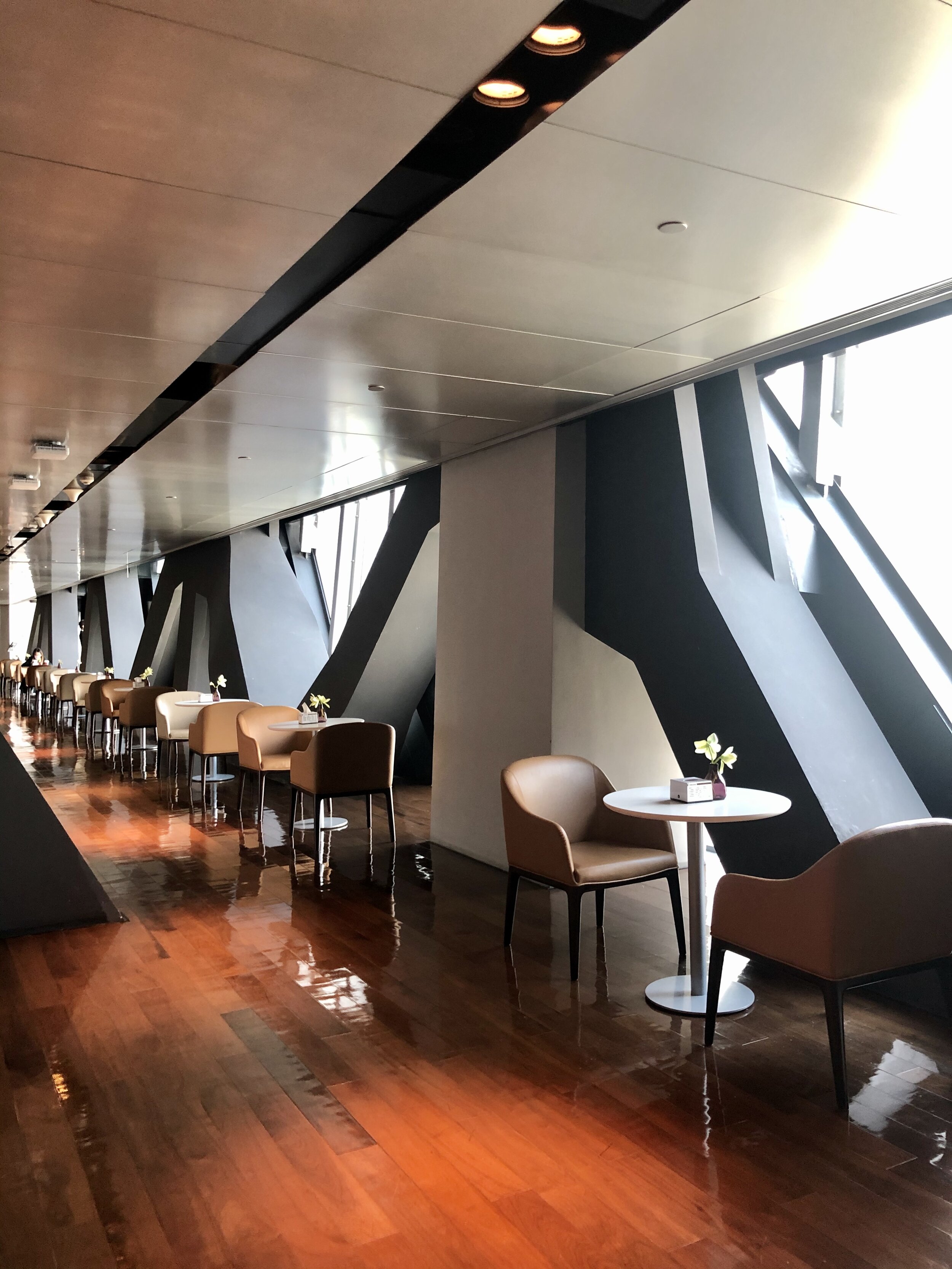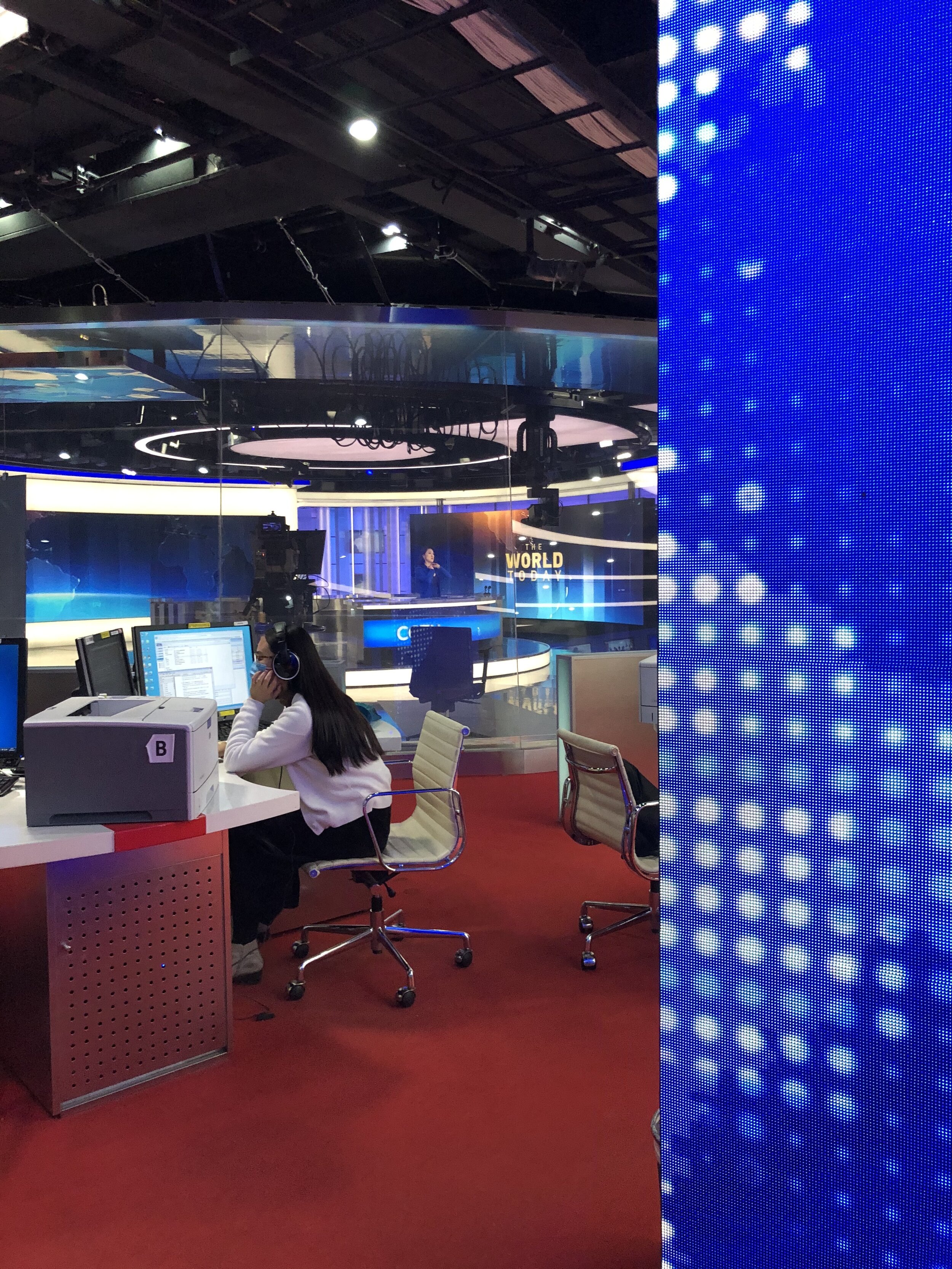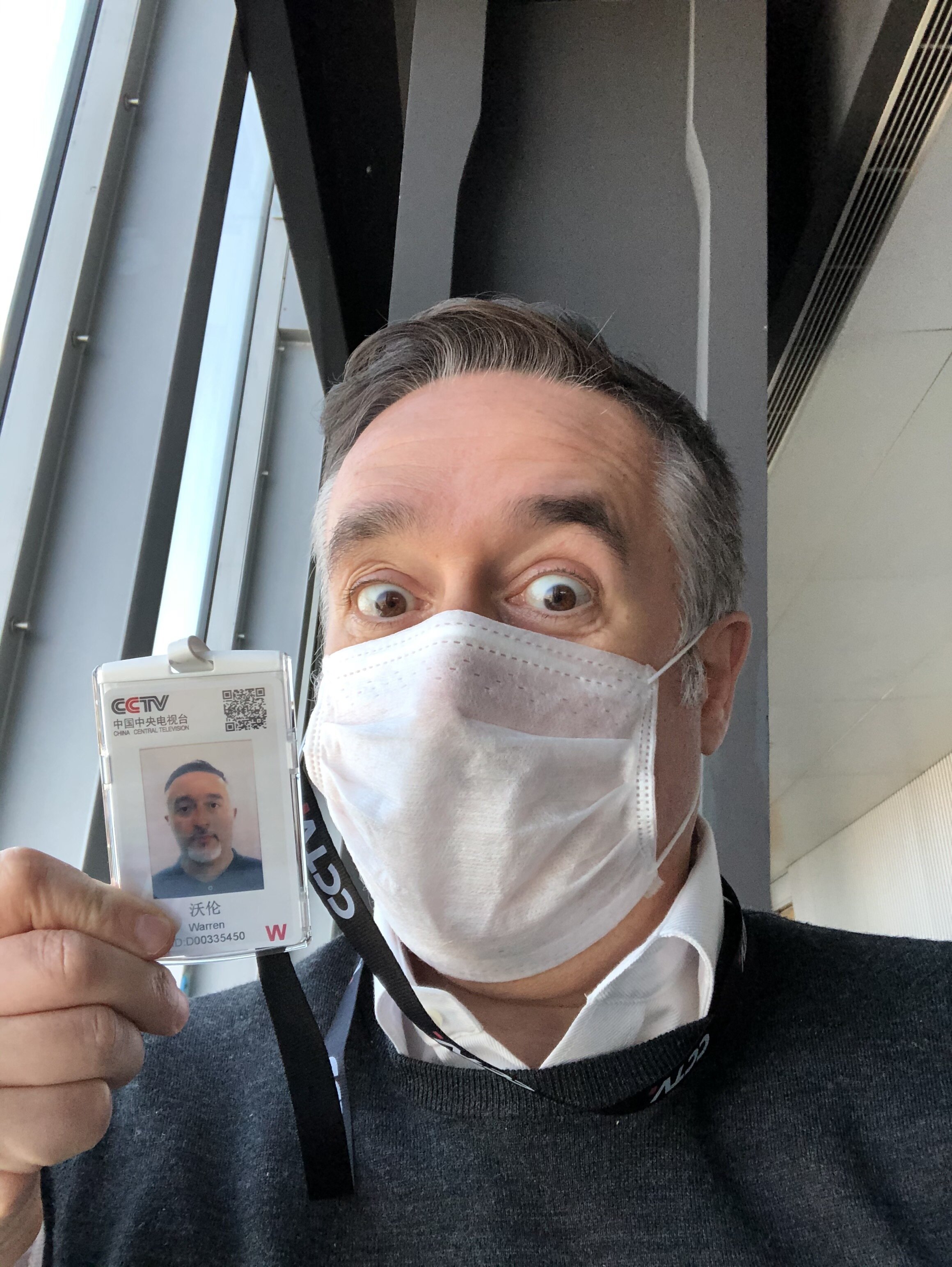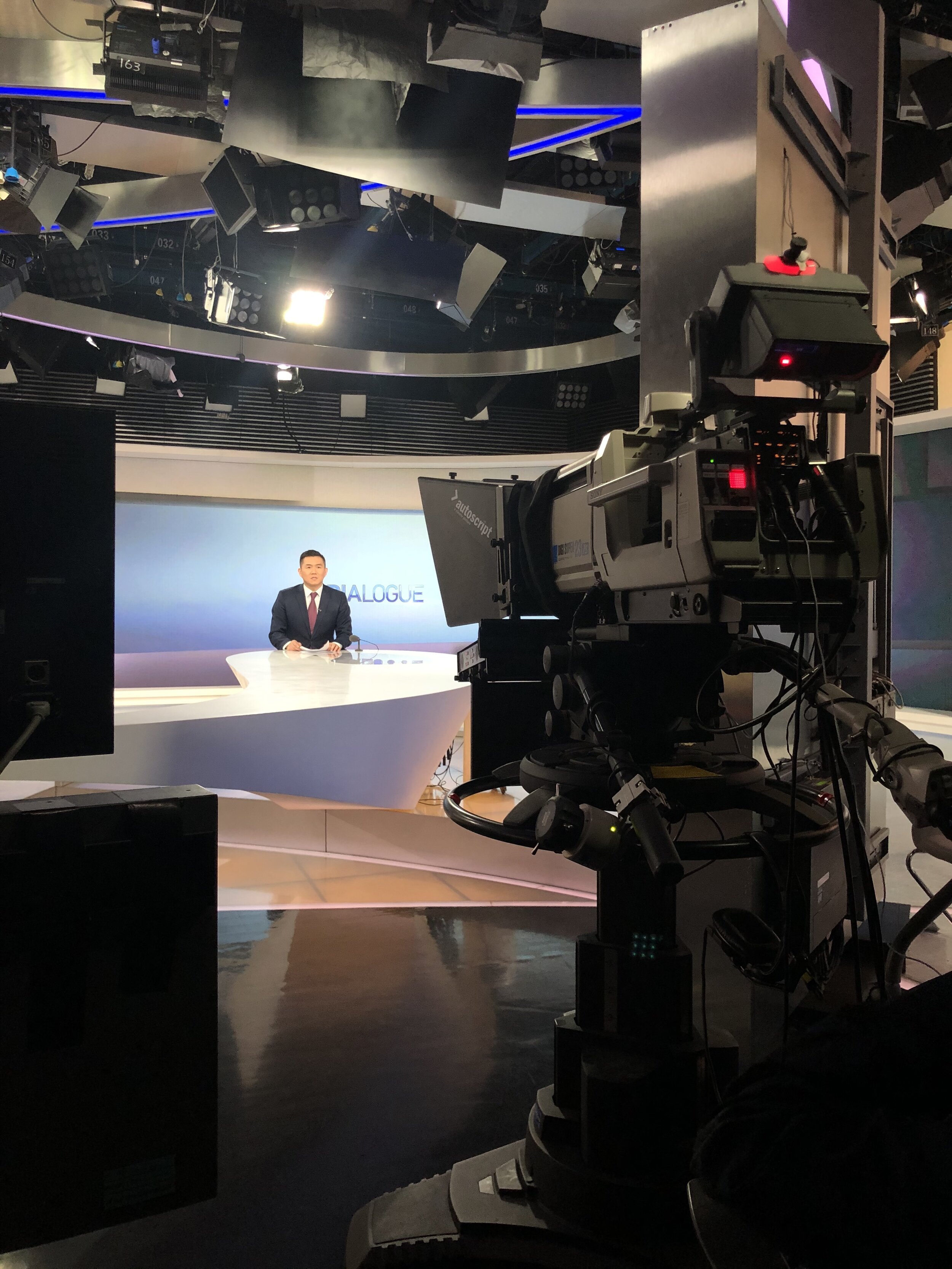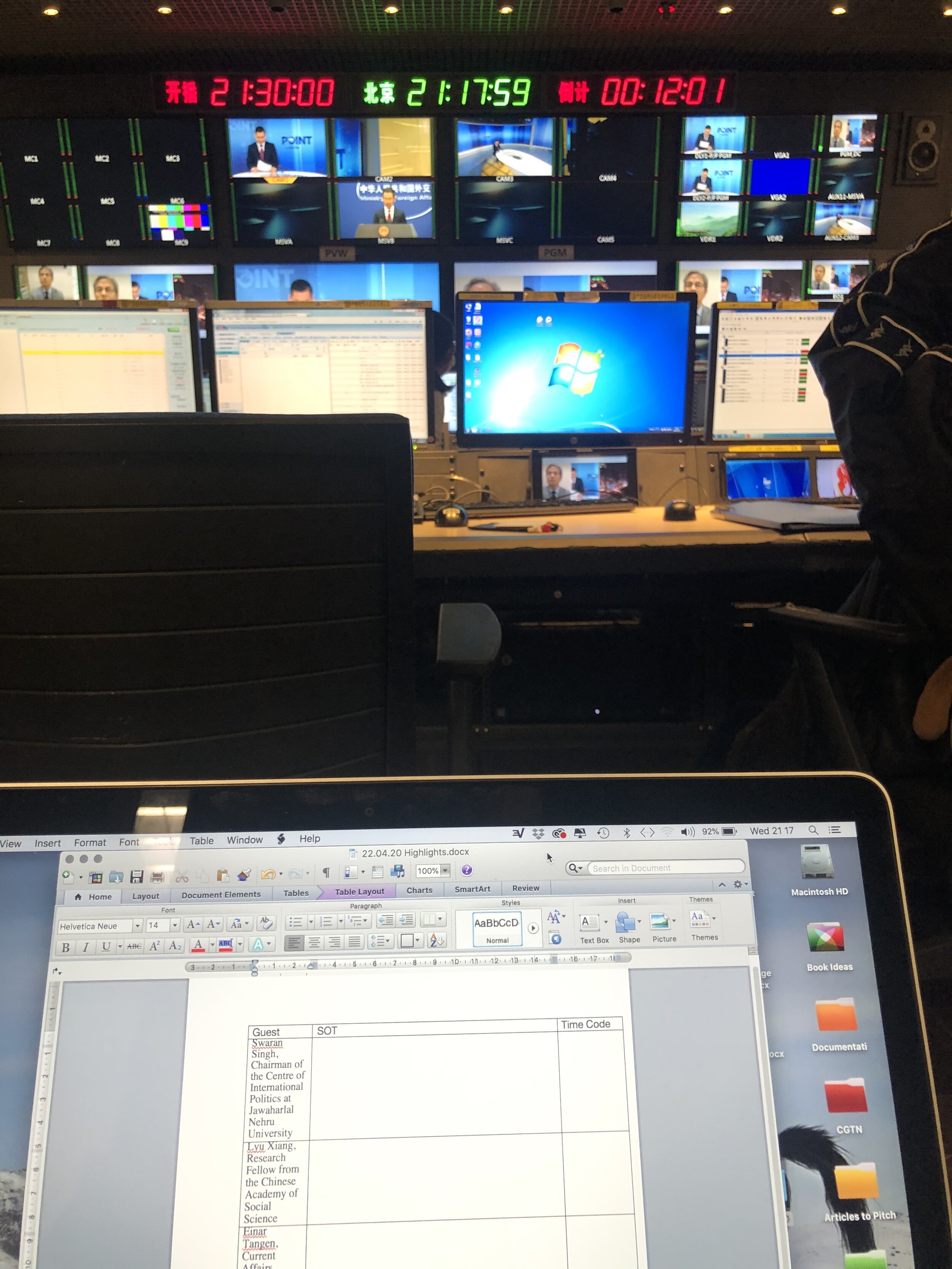That’s it in the middle. My office is ¾ of the way up the leg on the right..
Five weeks after arriving in Beijing, I was finally allowed swipe my pass, push through the turnstiles, wave at the snappily-dressed gentleman from the PAP (the People’s Armed Police) standing sentry in his glass box, put my bag through the scanner, swipe my pass again and enter the hallowed halls of the hollowed out trapezoid that is the CCTV Building on busy Guanghua Road.
It took me that long because my two weeks in quarantine had been followed by another two weeks working from the hotel and then home, and then an extra week of working from home, before the station’s management deemed me sufficiently safe to be allowed to meet my colleagues.
There were three of us being inducted that day, Hanali from New Zealand who was joining the HR department and Brian, from the US, who was going to be working on Breaking News. As I later discovered, our arrival was hotly anticipated.
“Oh, you’re that guy who’s come to join Dialogue, right? We’ve been wondering if you’d get here before they closed the borders. How’re you enjoying Beijing? ” one of the other writers on my floor asked me later that day. “Lucky you arrived in time. We were sure you’d be stuck outside.”
I’ll admit, that prospect had crossed my mind, as well, which is why with a sense of determination that I think may have struck the HR department as slightly worrying, I had blithely brushed off the warnings about closures, and masks and restrictions, and maintained all the way through the long, and often delayed lead up to finally arriving that yes, I still wanted to come to Beijing, yes, I knew about the virus, and no, it didn’t matter, so would you kindly get me there as soon as possible?
Certainly, that determination had struck some of my friends as peculiar. At the time, the pandemic hadn’t quite become the all-encompassing worry into which it has since evolved, but as I watched it creep closer and closer to England, my overriding fear was that either China, or the UK would shut their borders and then, well, then I’d be well and truly stuck.
But my determination paid off, and so instead of languishing in a grey bedroom in north-eastern England wondering what the hell I was going to do next and how I was going to make a living, here I was striding down the halls of Rem Koolhaas’ Esheresque contribution to the central Beijing skyline, rubber soles noisy on the polished marble floors, on my way towards my first paycheque in years, new job, new apartment and new life in hand. I was so relieved to be in Beijing, that from the moment I arrived, I’d found myself struggling not to give in to the giddy desire to burst into song, and as I squeaked through the vaulting atrium, towards the lifts that morning, the twin leaning towers of my new office building rising high above my head, I pictured myself tap dancing across the floor, like some latter-day Fred Astaire.
The rest of the morning was taken up with new job things, filling out forms, adding funds to our e-passes for use in the café or one of the eight restaurants, and touring the building, which also houses a supermarket, a doctor, a gym, two banks and a barber (all still shut as a result of outbreak regulations).
Rem’s Rocking Interior: I don’t care for Koolhaas normally, but this building is a beauty.
After lunch, it was finally time to meet the teams, though as I discovered, few of my colleagues were in the office, in part because most were working from home, but also because with the Covid-19 changes, few were coming into the office until shortly before the live evening broadcasts of the shows.
Over the next few days, I got to meet more of them, though I still haven’t met everyone, and discovered that I would be splitting my time between two current affairs talkshows, Dialogue and The Point, editing scripts, coming up with questions and taking part in episode meetings via WeChat, as face-to-face meetings were not (and are still not) taking place. They are young and dynamic, most in their mid-20s to mid-30s, though the hosts are older. One of them, Liu Xin, who is the host of The Point, is also something of a national icon, catapulted to fame after a live debate on the US-China trade war with an American anchor, Trish Regan of the execrable Fox Business TV network, last year. They also work extremely hard, so hard that I wonder what kind of work/life balance China adheres to, if at all . Messages come in around the clock, and almost every day, though thankfully, only a few require me to reply.
Work arrives in batches, sometimes in a flood, but more often than not in a steady drip through the day. Some shows are pre-recorded, others are live and when they are live, I am also required to go into the office in the evenings, to sit in on the broadcast and determine what subtitles are used during the show, and in the case of The Point, to also prepare a few Tweets and a teaser for use on Chinese social media network, Weibo. As The Point doesn’t air until 9:30, this can mean that I’m in the office until 10:30 or even 11pm, if there is disagreement over which Tweets are most appropriate, but normally that isn’t the case. As Dialogue is broadcast 6 days a week, I am also required to work some weekends, though time off is then given during the week.
For the most part, though, I continue to work from home, so in some ways, life is much the same as it was when I was freelancing. Whether this will change in the coming weeks, especially as office life returns to normalcy as is believed will happen after the upcoming annual meeting of the Chinese Communist Party, which is apparently going to officially announce the end of the majority of restrictions still in place, remains to be seen. If I do end up spending much more time in the office, at least once all the facilities open, there will be plenty to keep me occupied in the quiet moments between bursts of work and I have already made the lovely 38th Floor café a regular haunt, mostly for the panoramic vies it affords over the city.
In all, the transition has been smooth, both in terms of work and life. Work is both enjoyable and interesting. Occasionally, the constant ping of messages is enormously distracting, especially when I am trying to write, but as instantaneous communication also enables my out-of-office workstyle - and once I have an iPad with a cellular connection, to working outside home, too - it seems a reasonable price to pay. Beyond that, my new home Beijing is a remarkably easy city to live in, especially now that translation apps abound, but then after 20 years in the world’s least predictable, immensely frustrating but most utterly lovely country, anywhere else (with the possible exception of an actual warzone) was bound to be easy. And for giving me that advantage, I will thank Lebanon for the rest of my life.


